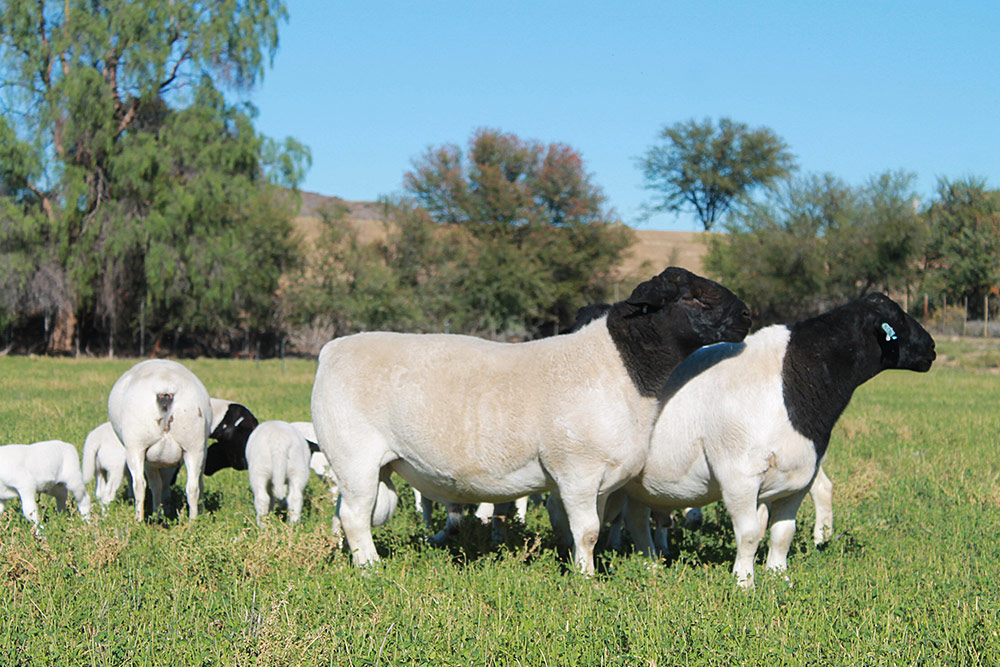Dorper sheep farming is increasingly becoming a lucrative venture in Kenya.
The Dorper breed is renowned for its resilience, adaptability to diverse climatic conditions, and rapid growth, making it a favorite among farmers in semi-arid regions.
Originally developed in South Africa, Dorper sheep are a crossbreed of Dorset Horn and Blackhead Persian, combining hardiness with superior meat quality.
In this guide, we’ll explore the essentials of Dorper Sheep Farming in Kenya, covering everything from the costs and feeding practices to breeding, grazing, and the pros and cons of this venture.
Is Dorper Sheep Farming in Kenya Profitable?
Dorper sheep farming is one of the most profitable livestock ventures in Kenya. The breed’s fast growth rate, high fertility, and low maintenance requirements make it a popular choice for farmers looking to maximize profits.
Dorper meat is prized for its tenderness and rich flavor, often fetching premium prices in local and export markets.
Farmers can earn revenue through various avenues:
- Meat production: Dorper meat is highly sought after for its tenderness and flavor, commanding premium prices in local and international markets.
- Breeding stock sales: Farmers can sell high-quality lambs or breeding ewes and rams at lucrative prices.
- Value addition: Products like processed meat and hides can further boost earnings.
Profitability also depends on efficient farm management. Farmers must focus on disease prevention, high-quality feed, and effective breeding practices to maximize their returns.
A well-managed Dorper sheep farm can break even within the first year, with each mature sheep selling for Ksh.20,000 to Ksh.30,000 or more.
The breed’s adaptability to arid and semi-arid conditions makes it particularly appealing to Kenyan farmers in areas like Narok, Kajiado, Machakos, and Laikipia, where traditional livestock often struggles. Dorper sheep require relatively low maintenance and can thrive on minimal feed compared to other livestock.
How Much Does Dorper Sheep Cost in Kenya?
The price of Dorper sheep in Kenya varies depending on factors such as age, weight, and whether the animal is purebred or a crossbreed. On average, the costs are as follows:
- Lambs (3–6 months): Ksh.10,000 – Ksh.15,000
- Yearlings (6–12 months): Ksh.15,000 – Ksh.20,000
- Breeding stock: Ksh.25,000 – Ksh.50,000 for certified purebreds
The demand for breeding stock is particularly high, with many farmers willing to pay a premium for certified purebred Dorpers. When purchasing, ensure you verify the animal’s lineage and health status.
Premium breeders offer certified purebred Dorpers, which come with a higher price tag but guarantee desirable traits such as high fertility, rapid growth, and disease resistance. Crossbred Dorpers, though cheaper, may not exhibit the same growth rates or resilience.
Farmers are encouraged to purchase sheep from reputable breeders or farms with a proven track record. This ensures they acquire healthy and well-bred animals that meet their farming goals.
Dorper sheep has striking resemblance to the Somali black headed sheep, but they have specific differences that set them apart.
How Long Does It Take Dorper Sheep to Mature?
Dorper sheep are a fast-growing breed, making them ideal for commercial meat production.
Typically, they reach market weight within 6 to 8 months when provided with adequate nutrition and care. This fast growth allows farmers to capitalize on shorter production cycles compared to other breeds.
For breeding purposes, Dorper sheep mature sexually at about 6 to 8 months, but it’s recommended to wait until they are at least 12 months old before breeding. Early breeding may hinder their growth potential and affect their reproductive performance.
In addition to rapid maturity, Dorper sheep are highly efficient converters of feed into body mass. Farmers can optimize growth rates by ensuring balanced nutrition and maintaining a stress-free environment.
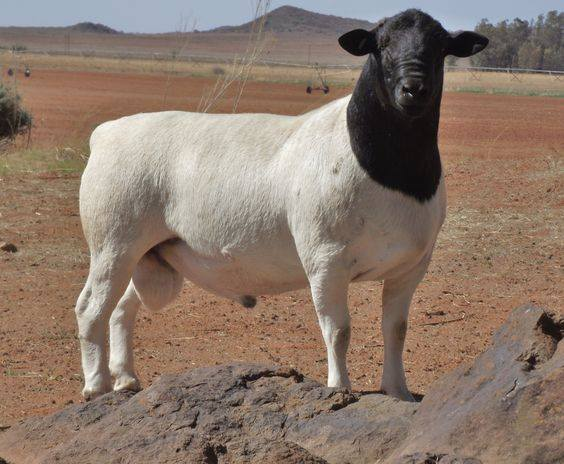
Feeding Practices: What to Feed Dorper Sheep?
Feeding is one of the most critical aspects of Dorper sheep farming.
These sheep are primarily grazers but can thrive in both traditional grazing systems and zero-grazing setups with supplementary feed.
- Forage: Grass such as Napier grass, Rhodes grass, and lucerne are excellent forage options for Dorper sheep. In regions where grazing is limited, crop residues like maize stalks, bean haulms, and sweet potato vines can be used.
- Concentrates: Supplementary feeding with commercial sheep pellets, crushed maize, or wheat bran is essential, especially during the dry season or for lactating ewes and fast-growing lambs.
- Minerals and Salt Licks: Provide mineral blocks or salt licks to ensure the sheep receive essential nutrients for bone development and overall health.
- Hydration: Clean, fresh water should always be available, as dehydration can lead to poor growth and productivity.
Proper feeding ensures better weight gain, healthier lambs, and increased fertility. Farmers should monitor their flocks closely for signs of malnutrition or overfeeding and adjust diets accordingly.
How Much Does a 6-Month-Old Dorper Sheep Weigh?
At six months, a healthy Dorper sheep can weigh between 40 kg to 55 kg. This weight largely depends on factors such as nutrition, management practices, and the genetic potential of the sheep.
Dorper sheep are known for their fast growth rate, with lambs typically gaining about 200–250 grams daily under optimal feeding conditions.
To achieve this weight, farmers should provide a balanced diet comprising quality forages, concentrates, and sufficient clean water. Regular deworming and vaccination schedules also play a critical role in maintaining the health and growth of the sheep.
How Many Times Can a Dorper Sheep Give Birth in a Year?
Dorper sheep are known for their high fertility rates, capable of lambing up to twice a year under optimal conditions. Their ability to reproduce frequently stems from a relatively short gestation period of about 150 days (5 months).
Most ewes give birth to twins, although single and triplet births are also common. This high lambing rate makes Dorper sheep farming an attractive option for farmers aiming to grow their flocks rapidly or maximize income from lamb sales.
To achieve frequent lambing, farmers should focus on providing adequate nutrition, maintaining proper health, and ensuring ewes are kept in a stress-free environment.
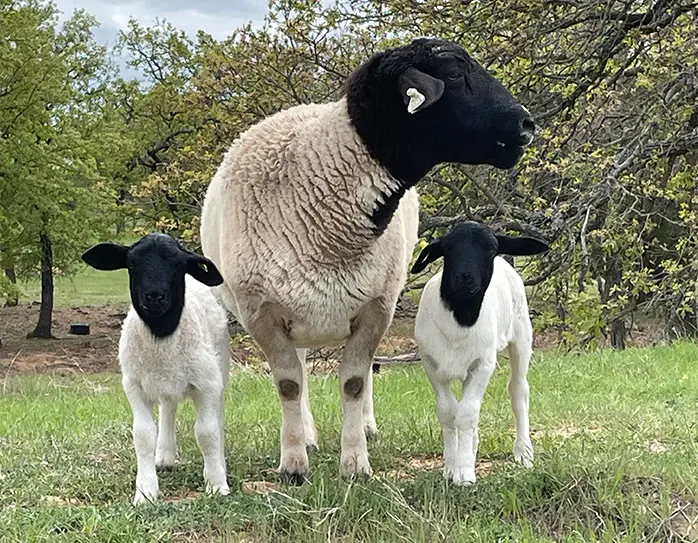
How Many Months Are Dorper Sheep Pregnant For?
The gestation period for Dorper sheep is approximately 5 months (150 days). During this time, the ewe requires close monitoring to ensure it receives a nutrient-rich diet to support fetal development.
Farmers should separate pregnant ewes into a calm and stress-free environment to minimize complications. Close observation during the final weeks of pregnancy can help ensure successful lambing.
You can use this dorper sheep gestation period calculator to know your sheep’s due date.
At What Age Can Dorper Sheep Breed?
Dorper sheep reach sexual maturity at about 6 to 8 months of age, although breeding is recommended when they are at least 10 to 12 months old to ensure the ewe’s physical development is adequate.
Rams can start breeding at around 8 months, but for best results, they should also be fully mature. Introducing ewes to a ram during their estrus cycle, which occurs every 16 to 17 days, increases the likelihood of successful conception.
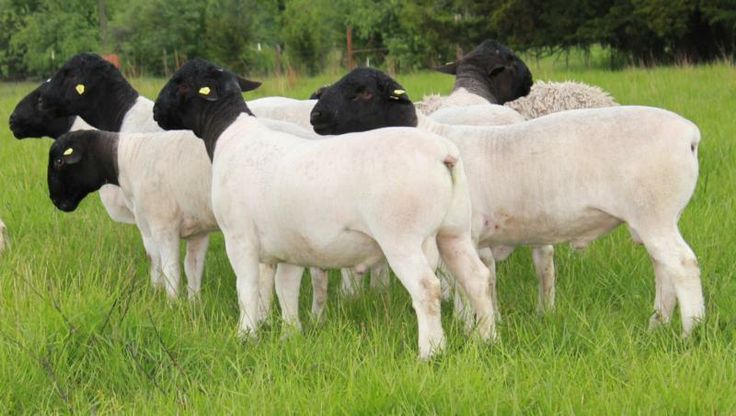
How Many Dorper Sheep Per Acre?
The stocking rate for Dorper sheep depends on the quality of the pasture.
Generally, you can keep 5 to 10 Dorper sheep per acre on natural pasture. If using improved pasture or employing supplementary feeding, this number can rise to 15 to 20 sheep per acre.
In zero-grazing setups, stocking rates can be higher, depending on feed availability and housing. Ensure the space is sufficient to avoid overcrowding, which can lead to diseases.
Overstocking should be avoided as it leads to pasture degradation, inadequate nutrition, and potential health issues. Rotational grazing is recommended to optimize land use and maintain pasture quality.
What Is the Lifespan of Dorper Sheep?
Dorper sheep have an average lifespan of 10 to 12 years, though their productive breeding years typically last up to 6 or 7 years. Rams may have a shorter productive lifespan due to their higher physical demands during mating seasons.
Good health management practices, including timely vaccinations, deworming, and proper nutrition, can help ensure a longer and more productive life for Dorper sheep.
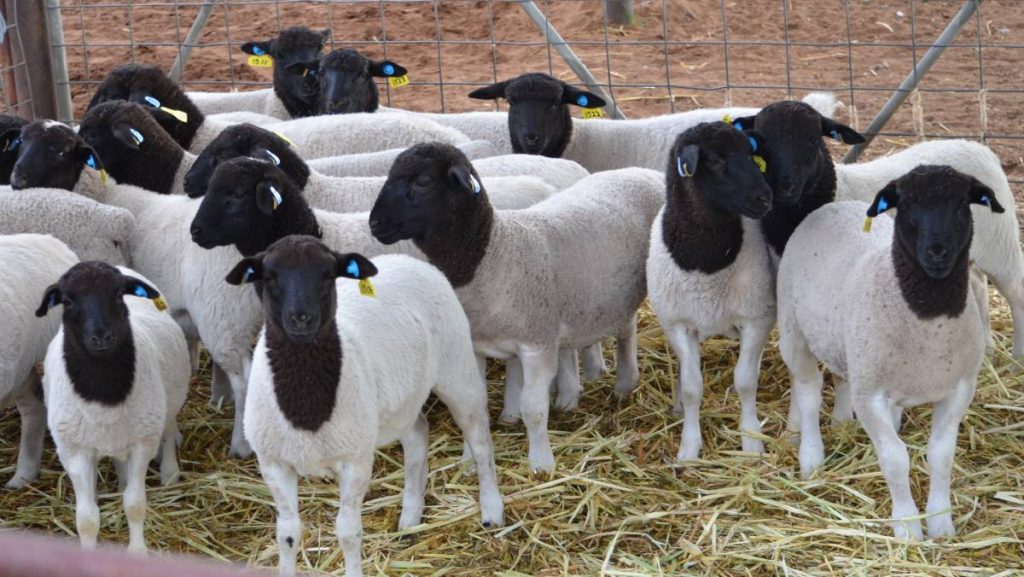
Zero Grazing vs. Traditional Grazing
Zero Grazing
This system involves confining sheep in a small area and providing them with feed such as cut grass, hay, silage, and concentrates.
Zero grazing is ideal for farmers with limited land or in areas with poor pastures. It ensures better disease control and allows for close monitoring of the flock. However, it requires higher labor and feeding costs.
Traditional Grazing
Sheep are allowed to graze freely on pasture. This system is cost-effective but requires more land and exposes the flock to predators and diseases. Traditional grazing also risks overgrazing if not properly managed.
Farmers can combine both systems, practicing rotational grazing and supplementing feed during periods of low pasture availability to optimize results.
Other Sheep Breeds That Do Well in Kenya
While Dorper sheep are popular, several other breeds thrive in Kenya’s diverse climatic conditions:
- Red Maasai Sheep: Known for their resistance to diseases and parasites, particularly in arid and semi-arid regions. They are valued for their meat quality and adaptability.
- Merino Sheep: Highly sought after for their fine wool, Merino sheep do well in cooler highland areas. Farmers seeking dual-purpose breeds for wool and meat may consider this option.
- Blackhead Persian Sheep: Adapted to arid and semi-arid regions, this breed is known for its excellent meat quality and ability to thrive on minimal resources.
- Dorpcroix: A crossbreed of Dorper and St. Croix sheep, combining the hardiness of the St. Croix with the rapid growth and meat quality of the Dorper.
- East Friesian Sheep: Primarily kept for milk production, this breed thrives in cooler areas with abundant feed.
Choosing the right breed depends on factors such as the farmer’s goals (meat, wool, or milk production), climatic conditions, and available resources.
Pros of Dorper Sheep Farming
- Fast Growth Rate: Dorpers mature quickly which allows for quicker returns on investment.
- High Fertility: With two lambing seasons annually, they offer high reproductive rates.
- Adaptability: They thrive in various climatic conditions found across Kenya.
- Disease Resistance: Dorpers are less susceptible to common sheep diseases compared to other breeds.
- Quality Meat Production: The meat from Dorper sheep is highly sought after due to its flavor and quality.
- Low Maintenance: They require minimal care compared to other livestock breeds.
- Hardiness: Dorper sheep thrive in harsh climates, making them ideal for arid and semi-arid areas
Cons of Dorper Sheep Farming
- Initial Investment: Starting a flock requires significant capital for land, infrastructure, and quality breeding stock. Plus, Purebred Dorpers can be expensive to acquire.
- Disease Management: While generally hardy, Dorpers still require regular health checks and vaccinations.
- Feeding Costs: In zero-grazing systems, supplementary feeding can be costly during dry seasons.
- Breeding Challenges: Access to quality breeding stock may be limited in some areas.
Dorper Sheep Breeders in Kenya
Below is a list of some reputable Dorper sheep breeders in Kenya:
| Farm Name | Location | Contact |
| Koitegan Dorper Farm | Eldama Ravine | 0722-123-456 |
| Sirikwa Dorper Farm | Uasin Gishu | 0723-234-567 |
| Ol Pejeta Conservancy | Laikipia | 0711-345-678 |
| Kakuzi Dorper Stud | Murang’a | 0724-456-789 |
| Rimpa Estates Ltd | Kiserian | Kone: 0718-614-765 |
| Empakai Farm | Isinya | Ole Saoin: 0722-895-616 |
| Arroi Dorper Studs | Arroi | Benjamin Sein: 0722-982-804 |
| Tuanet Farm | Kima | Jeremiah Ole Sein: 0722-858-872 |
| Mparos Farm | Nkama | Ole Naigisie: 0721-609-495 |
| Kwenia Farm | Isinya | Samuel Moinket: 0722-821-794 |
| Narresho Farm | Isinya | Emily Moinket: 0722-279-223 |
| El Karama Sahiwal Ltd | Laikipia | 0717-226-210 |
| Dorper Farm | Arroi | Kepoi Sentero (Ole Chief): 0722-944-597 |
| Embolioi Farm | Isinya | Paul Ole Nchake: 0727-685-313 |
| Christopher Kunder | Narok | 0722-314-134 |
| Naivasha Sheep & Goat Station | Naivasha | 020-205-3268 / 0750-428-275 |
| Loldia Leshau Ltd | Naivasha | 0733-636-611 |
| Gicheha Farm | Ruiru | 0722-223-903 |
| ADC Japata | Kitale | 0715-132-094 |
| ADC Nai | Endebess | 0715-132-094 |
| Amagoh Dorpers | Kangundo | Bernard Waigitu: 0732-849-400 |
| Kimose Sheep & Goat Station | Mogotio/Baringo | 0722-571-534 |
| Chemichemi Dorpers | Nyahururu | James Njoroge: 0722-434-517 |
| Acacia Ventures | Wiyumiririe, Nyahururu–Nyeri Road | William Ndungu: 0715-146-295 |
Source: Dorper Sheep Breeders Society of Kenya
Additional Resources
For more insights and guidance on Dorper sheep farming, explore the following resources:


